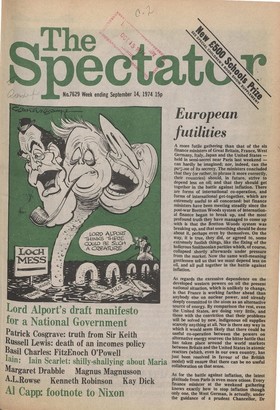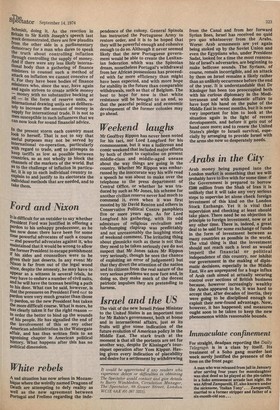European futilities
A more futile gathering than that of the six finance ministers of Great Britain, France, West Germany, Italy, Japan and the United States — held in semi-secret near Paris last weekend — can hardly be imagined; nor, indeed, can the puq-..ase of its secrecy. The ministers concluded that they (or rather, to phrase it more correctly, their countries) should, in future, strive to depend less on oil; and that they should get together in the battle against inflation. There are forms of international co-operation, and forms of international get-together, which are extremely useful to all concerned: but finance ministers have been meeting steadily since the post-war Bretton Woods system of international finance began to break up, and the most profound truth they have managed to come up with is that the Bretton Woods system was breaking up, and that something should be done about it, perhaps even by themselves. On the way, it is true, they did, or agreed to, some extremely foolish things, like the fixing of the ludicrous Smithsonian parities which, of course, collapsed shortly afterwards under pressure from the market. Now the same well-meaning gentlemen tell us that we must depend less on oil, and all pull together in the battle against inflation.
As regards the excessive dependence on the developed western powers on oil the present national situation, which is unlikely to change, is that France is working farther ahead than anybody else on nuclear power, and already deeply committed to the atom as an alternative source of energy. By comparison the rest, even the United States, are doing very little, and those with the conviction that their problems will be solved by new, indigenous oil supplies scarcely anything at all. Nor is there any way in which it would seem likely that there could be useful co-operation between the powers on alternative energy sources: the bitter battle that has taken place around the world markets between Britain and the United States in atomic reactors (which, even in our own country, has just been resolved in favour of the British model) will ensure that there can be no useful collaboration on that score.
As for the battle against inflation, the latest platitude from Paris is even more otiose. Every finance minister at the weekend gathering knows exactly how to stop inflation though only one, the West German, is actually, under the guidance of a prudent Chancellor, Dr Schmidt, doing it. As the reaction in Britain to Sir Keith Joseph's speech last Week demonstrated, there are few plaudits from the other side in a parliamentary democracy for a man who dares to speak the truth about controlling inflation through controlling the supply of money. And if there were any less likely international body than a gathering of finance ministers to counsel such a method of attack on inflation we cannot conceive of it. For they have been bodies of finance ministers who, since the war, have again and again striven to create article money — money with no substantive backing at all — in the form of reserve units, or international drawing units so as deliberately to increase the amount of money in suPply for international trade. It is not to men susceptible to such influences that we can now look for sound financial advice.
In the present storm each country must look to herself. That is not to say that .useful purposes may not be served by international co-operation, particularly With regard to trade, ant to attempts to keep tariffs as low as possible between countries, so as not wholly to block the Channels of the markets of the world. But as to the challenge of inflation in particular, it is up to each individual country to explain to and justify to its electorate the individual methods that are needed, and to take them.



































































